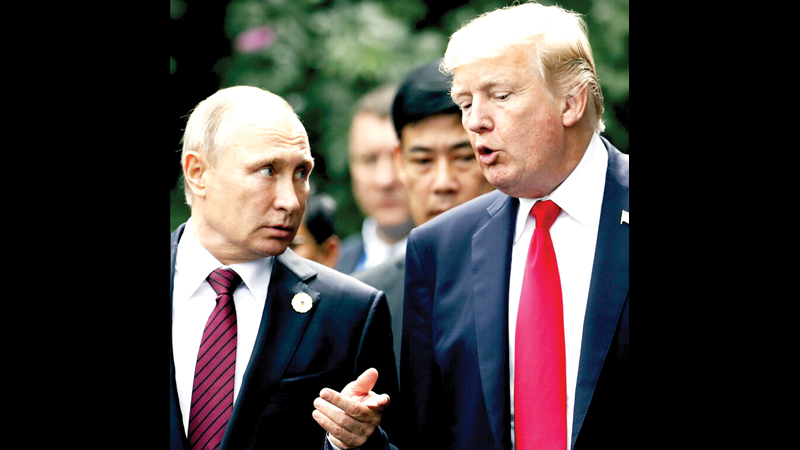Donald Trump’s triumphant move to the White House has palpable indications to the Kremlin as this tectonic shift occurred at a time when the Russian offensive had earned solid progress on the Ukrainian war front. For the past three months, Ukrainian forces have lost the territory at an accelerated pace causing a debacle for Kiev. Despite heavy losses faced by Russians, they have formidably moved to the fore due to the heavy manpower and the conventional use of infantry.
From Moscow’s point of view, Russia’s war in Ukraine is a mere pretext for its proxy war with the West as the Biden administration’s policy of promoting Atlanticism served the purpose of Europe in confronting the Russian paranoia while leveraging the chasm between the US and Russia. Notwithstanding the formal phone conversations that Trump had with Volodymyr Zelenskyy before the Republican summit, the Trump administration will have rather less favourable impacts upon Kyiv as Trump’s policy essentially consolidates on boosting the US economy by cutting the external aid for its allies. Trump’s recent remarks on the US’s defence expenditure for Taiwan in a context where Taiwan does not pay enough for the US capture how Trump’s administration would look in the days to come.
The potential trajectories that may develop under Trump could enhance Moscow’s ability to achieve its goals, which appeared to falter during Biden’s administration.
The personal rapport between Trump and Putin is likely to play a significant and perhaps surprising role in shaping Russo-American relations. Putin often comments on his belief that he can work effectively with others, which suggests a certain capability for manipulation. Both George W. Bush and Trump failed to recognise Putin’s political evasiveness and skills in persuading his opponents. After meeting Putin during the early days of his leadership, George W. Bush expressed admiration for him as a straightforward leader who was trustworthy.
International affairs
Much later, Trump was taken into Putin’s charm during his first tenure in the White House. According to Fiona Hill, what Putin wants from Trump is to see America’s exit from the theatre of international affairs which will eventually sharpen Moscow’s orbit in the heartland. A man known as Putin’s Rasputin, Political theorist Alexander Dugin always remained optimistic about Trump.
His anathema with liberalism often alludes to restoring Russian nationalism as a bulwark for globalist expansion and Trump’s adamant position to curtail the NATO expenses is a perfect match for what the Russian ideologue aspires to see. Within 48 hours after the victory, addressing the Valdai forum in Sochi, Putin praised Trump for his courage and said, “What was said about the desire to restore relations with Russia, to bring about the end of the Ukrainian crisis, in my opinion, this deserves attention at least”.
However, Moscow is equally aware of Trump’s unpredictability from his first term in the White House, which ultimately led to the lowest ebb of the relations between the two countries. Instead of cementing the affairs, Trump’s previous term ended with a record amount of anti-Russian sanctions, and practically zero dialogue. Behind this mistrusting belligerent, there is a sanguine hope for Moscow that Trump’s strong dislike for spending for America’s global ventures would strike Ukrainian war machinery, which has been dependent on the enormous military and financial assistance received from the Biden administration.
US and NATO allies
In 2020, Trump ordered the withdrawal of around 10,000 U.S. troops from Germany, underscoring American commitment to defend its allies, which is a blatant contrast to the Atlantic Charter.
It can fret the NATO members in the continent when its dominant member stands ambivalent towards NATO and this creates a perfect situation for Russia to accelerate its deterrence policy. As Russia’s geopolitical strategist Sergey Karganov reputedly appealed to Putin, Russia may lower its threshold for using nuclear weapons causing an existential paranoia in Europe.
Another factor which is likely to shape the relations between the USA and Russia is Tesla CEO Ellen Musk’s shadowy role in the US politics. Musk’s affinity with Trump as his firm supporter and at the same time his alleged connections with Putin as revealed by the Wall Street Journal is a salient concern.
His shift from being a supporter of Ukraine to a critic of Washington’s military aid to Kyiv under Zelenskyy denotes his ability to match with Trump in putting a closure to America’s role in Ukraine.
On the whole, Trump’s ascendency to the White House for the second term is a significant loss for the globalists who relied on American grace symbolising the triumph of liberalism.
Nonetheless, Trump’s own nature as an unpredictable statesman resembling his Russian counterpart Vladimir Putin can equally create a sign of bleakness to Russia.
The writer is a lecturer at the Department of International Law, Faculty of Law, General Sir John Kotelawala Defence University









